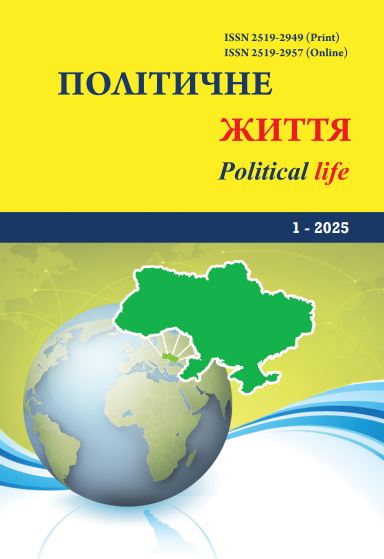Authoritarianism as a geopolitical phenomenon
DOI:
https://doi.org/10.31558/2519-2949.2025.1.9Keywords:
authoritarianism, geopolitics, political regime, world order, tellurocracy, authoritarianizationAbstract
The article examines the geopolitical context and the main characteristics and examples of the main modern world autocracies as subjects of opposition to democratic Western civilization. The geopolitical law of fundamental dualism: the main mechanism of world history is the collision and confrontation between tellurocracy - a terrestrial autocratic civilization and thalassocracy - a maritime democratic civilization came into force during a new stage of human development in the 20s. 21st century. Because of this, the focus of attention in political research is shifting to a comprehensive study of the features of the leading modern authoritarian regimes as the main challenge to the existing international order. In the modern understanding, tellurocracy is interpreted as a form of state organization, which is aimed at the development of large continental spaces with the aim of joining neighboring states and colonizing regions of the land. Along with democracy and totalitarianism, authoritarianism is one of the main types of modern political regime. Autocracy is a tool for the exercise of state power, which is characterized only by the formal declaration of political rights and freedoms of citizens, the narrowing of the influence of democratic institutions and norms, and the disregard of public opinion and the will of the majority. In 52 countries of the world, for almost 20 years, the trend towards authoritarianization of the political regime has been developing. By 2023 38% of the world's population lives under authoritarianism. It is concluded that the world's leading autocracies - China, russia and North Korea - are undergoing a transition from authoritarianism to totalitarianism. The current stage of development of the world geopolitical process is characterized by the attempt of the leading autocracies to change the world order in their favor, for this the thesis of a multipolar world is put forward.
References
Лук’янюк В. Словник іншомовних слів. 2001-25. URL: https://www.jnsm.com.ua/cgi-bin/m/s2.pl?Article=17895&action=show
Політична наука. за заг. ред. М. М. Вегеша; відп. за вип. М. Токар; рец. : В. Климончук, В. Марина, Ю. Сливка. ДВНЗ "Ужгор. нац. ун-т", каф. політології. Ужгород: Говерла, 2009. 444 с.
Линц Х. Тоталитарные и авторитарные режимы. Неприкосновенный запас. 2018. №4, С.16–62.
Скрипнюк О. О. Сучасний авторитарний режим: характерні риси та прояви. Journal «ScienceRise: Juridical Science». 2020. № 2 (12). С. 18-23.
Schedler A. Electoral Authoritarianism: The Dynamics of Unfree Competition. Boulder : Lynne Rienner Publishers, 2006. 267 p.
Pridham G. EU Enlargement and Consolidating Democracy in Postcommunist States. Journal of Com- mon Market Studies, 2002. № 40, Р. 953-973.
Свобода у світі - 2024: зростаюча негативна дія фальсифікованих виборів та збройних конфліктів. Щорічна аналітична доповідь «Freedom house». 2024. Вип.51. URL: https://freedomhouse.org/ru/article/novyy-doklad-manipulyacii-vyborami-i-vooruzhennye-konflikty-osnovnye-prichiny-snizheniya
Єгоров Г., Гур’єв С., Сонін К. Свобода ЗМІ, бюрократичні стимули та ресурс. Робота Центру демократії, розвитку та верховенства права (CDRL). 2006.№ 71.
Березовська-Чміль О. Порівняльний аналіз демократичного та авторитарного політичних режимів. Вісник Прикарпатського університету. Серія: Політологія. 2023. Вип. 15. С. 11-17.
Примуш М. В., Ярош Я. Б. Політичний дискурс щодо функціонування політичних партій в Україні. Вісник Донецького національного університету імені Василя Стуса. Серія політичні науки. 2020. № 5. С. 22-28.

